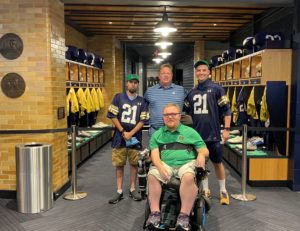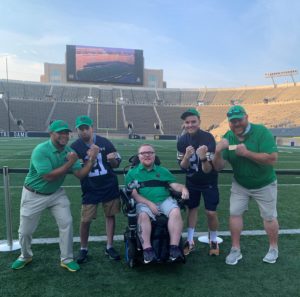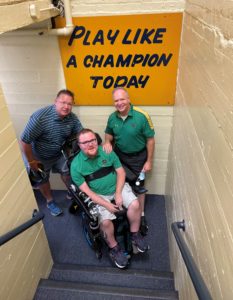By Josh Brumm, CEO of Dyne Therapeutics, as part of the From The Trenches feature of LifeSciVC
One morning in early June I was reading my LinkedIn feed and saw something that caught my eye – a university was establishing a minor in science and patient advocacy. I hadn’t heard of a college formalizing a program focused on preparing the next generation to become advocates. I was inspired by the innovative nature of the program and felt an immediate connection to the possibilities as CEO of a company that has made delivering for patients the center of our mission and as a graduate of the university launching the program, Notre Dame.
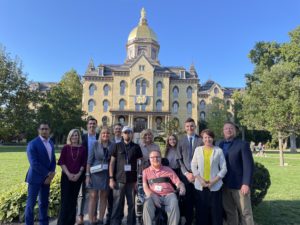 Fast-forward three months later, on September 17th, we were on the Notre Dame campus for a Rare Patient Advocacy Summit. The event included other members of Dyne’s leadership team, University students and faculty, and affected individuals and families from all three disease areas in which we have programs: myotonic dystrophy type 1 (DM1), Duchenne Muscular Dystrophy (DMD) and facioscapulohumeral muscular dystrophy (FSHD). Through our participation, Dyne learned how patient advocacy is being perceived as an increasingly strategic advantage for students considering careers in healthcare, and how beneficial these relationships are for them. We also heard from Sean, Russell, Suzette and BillyDean that their participation in workshops and panels has helped validate their life experiences and the profound impact of their disease burden, and they also shared their perspective on opportunities to improve care.
Fast-forward three months later, on September 17th, we were on the Notre Dame campus for a Rare Patient Advocacy Summit. The event included other members of Dyne’s leadership team, University students and faculty, and affected individuals and families from all three disease areas in which we have programs: myotonic dystrophy type 1 (DM1), Duchenne Muscular Dystrophy (DMD) and facioscapulohumeral muscular dystrophy (FSHD). Through our participation, Dyne learned how patient advocacy is being perceived as an increasingly strategic advantage for students considering careers in healthcare, and how beneficial these relationships are for them. We also heard from Sean, Russell, Suzette and BillyDean that their participation in workshops and panels has helped validate their life experiences and the profound impact of their disease burden, and they also shared their perspective on opportunities to improve care.
I also had the opportunity to announce that in 2022, Dyne will offer two summer internships to students pursuing Notre Dame’s new Minor in Science and Patient Advocacy. The event marked the start of our partnership to support Notre Dame’s efforts to build its program. We are already thinking about ways to connect the university to organizations, clinicians and others working in the field of patient advocacy, rare disease awareness and drug development
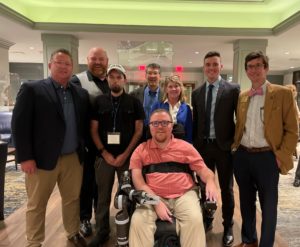 Dr. Santiago Schnell, who became Dean of the College of Science at Notre Dame just a couple of weeks before the Summit said, “This new minor program is a great example of thinking differently about how we engage students in science and deepen their understanding of the many careers they could pursue that can impact patient care. It has also sparked our creative juices when it comes to identifying ways to extend Notre Dame’s connections with companies, advocacy organizations and other key partner community members who share our commitment to fostering advancements that answer the world’s toughest questions and solve its most enduring problems. I think we are just getting started!”
Dr. Santiago Schnell, who became Dean of the College of Science at Notre Dame just a couple of weeks before the Summit said, “This new minor program is a great example of thinking differently about how we engage students in science and deepen their understanding of the many careers they could pursue that can impact patient care. It has also sparked our creative juices when it comes to identifying ways to extend Notre Dame’s connections with companies, advocacy organizations and other key partner community members who share our commitment to fostering advancements that answer the world’s toughest questions and solve its most enduring problems. I think we are just getting started!”
At Dyne, we’ve made listening to and learning from patients a focus from the earliest days of the company. It’s core to our mission of delivering life-transforming therapies for people living with rare muscle diseases. As part of that, we think a lot about how important it is to balance hope for individuals and families living with rare muscle diseases and creatively think about how we can connect with the community.
Hearing a disease diagnosis is overwhelming – certainly for affected individuals, and also for their families and caregivers. This is inevitably followed by a journey down the rabbit hole of online research in a quest for answers and options, and by a flood of well-meaning friends sharing their personal experiences and opinions. A path forward may seem unclear, or worse, non-existent. This is particularly true for people living with rare diseases, where information, science and therapeutic development need to catch up with this very real need. Bridging that gap for people with rare muscle diseases is our core focus at Dyne Therapeutics. In a previous ‘From the Trenches’ blog co-authored with Joachim Boekelmann, an attorney for a global insurance company living with DM1, a disease for which there are no approved therapies, I shared that my fellow Dynamos and I feel responsible to the people who are counting on us to deliver for them. That’s a responsibility I feel in my bones, and sometimes it even wakes me up at night.
So as we advance our programs into and through clinical development, our path to hope is not a one-way street. Our goal is to engage in true dialogue with affected individuals and families every step of the way and to become trusted partners. Only by working closely with affected communities can we begin to appreciate their most acute needs, greatest aspirations, and day-to-day limitations as well as best inform and design our clinical trials for success. Learning from their personal journeys – from the start – could one day hold the key to deliver a life-changing therapy.
So, why is early patient engagement so critical for biopharma companies – especially for those like Dyne that haven’t yet commercialized a product? In simple terms, if affected individuals and famlies are truly central to your mission and R&D efforts, learning about their challenges and gaining a meaningful understanding of their unique disease burden is the single most powerful way to create a win-win for the company and your patient population. Cultivating a strong connection between the company and affected individuals from the earliest stages of drug discovery can influence factors such as target product profile, drug administration, and trial design and protocol. For instance, affected community members have stated that halting disease progression would constitute meaningful clinical benefit; the anxiety people feel about what the disease will bring in terms of future symptoms and loss of function can significantly affect quality of life. Others say they try to focus on the things they can still do that they enjoy, not their physical limitations. Comments like these make two things clear to us: one is that delivering functional benefits to affected individuals would be greatly valued, and two, that we should try to minimize physical challenges for people who want to participate in our clinical trials or access a potentially approved product some day.
In the end, the ability to streamline the product and clinical development processes offers the potential to accelerate therapeutic advances and regulatory approvals – which is what people living with these diseases need most.
Companies advancing new therapeutic candidates can lose sight of what really matters as it relates to treatment and support if they focus solely on the development priorities. Not including people living with these diseases in your strategy, plans, and conversations is an enormous missed opportunity if your intention is to develop treatments that truly move the needle for these communities. I’m proud to share that Dyne has prioritized patient engagement as a function within our organization, hiring a patient advocacy veteran to lead our advocacy efforts less than a year after we were launched. We have formed strong, collaborative relationships with patient groups, clinicians, academia, and other partners whose patient reach and impact are invaluable to our work.
Events around awareness days and the work we have done at Dyne to host regular panel discussions and fireside chats with affected individuals and advocacy organizations also have tremendous impact on employee engagement. It was inspiring for our team to hear Sean, Russell, Suzette and BillyDean share their perspectives with us and gratifying for them to know that our group is committed to improving care. It was also a personal joy to see them experience being at Notre Dame, particularly during the excitement of a game weekend.
It’s easy to get focused on current research work or other day-to-day tasks and these interactions remind us all why we do what we do. It’s exciting to see what our focus, hard work and dedication could mean for affected people and their families. We have woven this into the DNA of Dyne and we are all the better for it.
Dyne will always “show up” for affected individuals and families – each day in our work, and through our valued collaborations, special events, our social channels and online. Their stories are what motivate us each day and we will always work hard to amplify their voice. These communities are vital stakeholders and partners, and I speak for all of us at Dyne when I say it would be the honor of our lifetimes to one day deliver for them truly transformative therapies.





